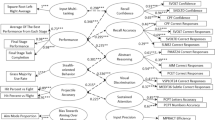Abstract
A scale measuring real-time strategy (RTS) game experience was created and used to determine whether RTS experience acted as a nuisance or confounding variable in a serious game examining sunk cost effects (SCE). A sample of 164 males, 324 females, 11 non-binary and 2 unclassified participants with a mean age of 43.53 completed the Real-Time Strategy Experience Scale (RTSES). A smaller sample of 63 males, 79 females, 2 non-binary and 1 unclassified participant with a mean age of 40.9 also played Magnate: an RTS-style serious game measuring SCE. Contrary to expectations, a single factor of general and strategy gaming experience was found, while two factors of RTS gaming experience were found: one comprised of experience playing popular titles, and another playing titles with more diverse game mechanics. However, a weak, positive relationship between RTS experience and game performance was found, as well as a weak, negative relationship between SCE and game performance. There was insufficient evidence of a relationship between RTS experience and SCE, which meant that the positive relationship between SCE and game performance remained largely unchanged after accounting for RTS experience. These results suggest that while RTS experience can act as a nuisance variable in studies using serious game performance as a dependent variable, there was no evidence of a confounding relationship with SCE as an independent variable in this instance. Validity of the RTSES could be improved with items focusing more on game mechanics rather than genre, which may make it easier to identify these relationships.
Access this chapter
Tax calculation will be finalised at checkout
Purchases are for personal use only
Similar content being viewed by others
References
Washburn, D.A.: The games psychologists play (and the data they provide). Behav. Res. Methods Instrum. Comput. 35, 185–193 (2003). https://doi.org/10.3758/BF03202541
Chesney, T., Chuah, S., Hoffmann, R.: Virtual world experimentation: an exploratory study. J. Econ. Behav. Organ. 72(1), 618–635 (2009)
Vermillion, S.D., Malak, R.J., Smallman, R., Becker, B., Sferra, M., Fields, S.: An investigation on using serious gaming to study human decision-making in engineering contexts. Des. Sci. 15(3) (2017)
Good, D.: Predicting real-time adaptive performance in a dynamic decision-making context. J. Manage. Organ. 20(6), 715–732 (2014)
Ahmad, M.A., Borbora, Z., Shen, C., Srivastava, J., Williams, D.: Guild play in MMOGs: rethinking common group dynamics models. In: Datta, A., Shulman, S., Zheng, B., Lin, S.-D., Sun, A., Lim, E.-P. (eds.) SocInfo 2011. LNCS, vol. 6984, pp. 145–152. Springer, Heidelberg (2011). https://doi.org/10.1007/978-3-642-24704-0_19
Shen, C., Monge, P., Williams, D.: Virtual brokerage and closure: network structure and social capital in a massively multiplayer online game. Commun. Res. 41(4), 459–480 (2012)
Reilly, A.: A complex adaptive systems approach to personality and social psychology through design sciences. Doctoral thesis, The Australian National University, Canberra, Australia (2020)
Apperley, T.H.: Genre and game studies: toward a critical approach to video game genres. Simul. Gaming 37(1), 6–23 (2006)
Halim, Z., Atif, M., Rashid, A., Edwin, C.A.: Profiling players using real-world datasets: clustering the data and correlating the results with the big-five personality traits. IEEE Trans. Affect. Comput. 10(4), 568–584 (2019)
Roth, S., Robbert, T., Straus, L.: On the sunk-cost effect in economic decision-making: a meta-analytic review. Bus. Res. 8(1), 99–138 (2014). https://doi.org/10.1007/s40685-014-0014-8
Moon, H.: Looking forward and looking back: integrating completion and sunk-cost effects within an escalation-of-commitment progress decision. J. Appl. Psychol. 86(1), 104–113 (2001)
Brown, G.W., MacLean, I., McMillan, A.: A concise oxford dictionary of politics and international relations, 4th edn. Oxford University Press, Oxford (2018)
Friedman, D., Pommerenke, K., Lukose, R., Milam, G., Huberman, B.A.: Searching for the sunk cost fallacy. Exp. Econ. 10, 79–104 (2007)
Sophis, M.J.: Temporal attention, the sunk cost effect, and delay discounting. Doctoral dissertation, University of Kansas (2018)
Dijkstra, K.A., Hong, Y.: The feeling of throwing good money after bad: the role of affective reaction in the sunk cost fallacy. PLoS ONE 14(1), e0209900 (2019)
Lee, J.H., Karlova, N., Clarke, R.I., Thornton, K., Perti, A.: Facet analysis of video game genres. In: iConference 2014 Proceedings, pp. 125–139 (2014)
Author information
Authors and Affiliations
Corresponding author
Editor information
Editors and Affiliations
Appendix
Appendix
Initial list of RTSES items.
-
1.
I have played games.
-
2.
I have played games on more than one type of device.
-
3.
I have played a lot of different games.
-
4.
I don’t know much about gaming.
-
5.
I have a lot of experience in playing games.
-
6.
I have played games that involve a lot of thinking.
-
7.
I have played strategy games.
-
8.
I have played games that require complex decision making.
-
9.
I haven’t played many games that involve strategic thinking.
-
10.
I have played games that involve managing resources.
-
11.
I have played games that require planning.
-
12.
Warcraft.
-
13.
Command and Conquer/Red Alert.
-
14.
Starcraft.
-
15.
Age of Empires.
-
16.
Anno.
-
17.
Populous.
-
18.
Empire Earth.
-
19.
Europa Universalis.
-
20.
Total War.
-
21.
Hearts of Iron.
-
22.
Company of Heroes.
-
23.
Supreme Commander.
-
24.
Warhammer 40,000.
-
25.
Stronghold.
Rights and permissions
Copyright information
© 2022 The Author(s), under exclusive license to Springer Nature Switzerland AG
About this paper
Cite this paper
Reilly, A., Kelly, L., Lough, K. (2022). Gaming Experience as a Nuisance or Confounding Variable in Serious Games for Research: Creating a Scale Measuring RTS Experience in a Serious Game Exploring the Sunk Cost Effect. In: Söbke, H., Spangenberger, P., Müller, P., Göbel, S. (eds) Serious Games. JCSG 2022. Lecture Notes in Computer Science, vol 13476. Springer, Cham. https://doi.org/10.1007/978-3-031-15325-9_2
Download citation
DOI: https://doi.org/10.1007/978-3-031-15325-9_2
Published:
Publisher Name: Springer, Cham
Print ISBN: 978-3-031-15324-2
Online ISBN: 978-3-031-15325-9
eBook Packages: Computer ScienceComputer Science (R0)



